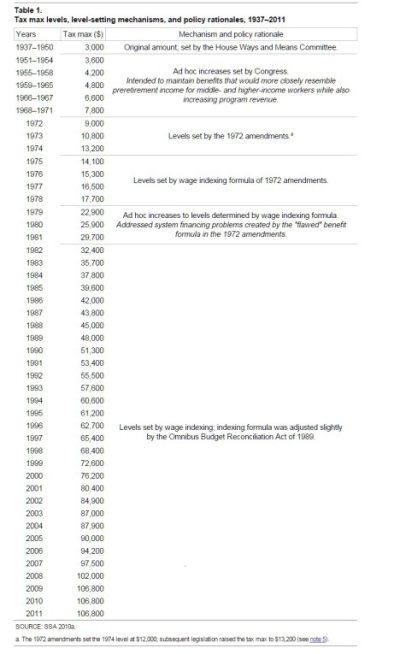lawman3966
Recycles dryer sheets
- Joined
- Jan 8, 2008
- Messages
- 84
From the analysis I present below, it's beneficial to wait from age 69 to age 70, especially if a low interest rate environment prevails at the time of making the decision to delay.
SS benefits were intended to be actuarially neutral. However, in practice, the intended neutrality may or may not be achieved, depending upon currently prevailing real interest rates.
The determination of when to take benefits with the 62-70 age range depends on two main variables: (1) whether you think your life expectancy is greater or less than the generally stated life expectancy for your age and gender; and (2) the real interest rate at the time you make the decision to delay for another year (or shorter period).
Two resources are needed to determine whether it's actuarially beneficial to delay taking benefits: (a) the changes in monthly payouts with age; and (b) the social security actuarial life table, both of which I've linked to below:
Early or delayed retirement
Actuarial Life Table
I'll provide one example using male life expectancy from the actuarial table for a person born in 1960. In theory, hundreds of calculations could be made since the SS benefit amount increases in one-month or two-month periods - one is not limited to waiting a whole year to get a benefit increase.
I will use generic units. These can be readily scaled to actual dollars.
At age 69, the monthly benefit is 124, and at age 70 is 132.
The life expectancies for this person are: (a) 14.4 at age 69 and (b) 13.73 at age 70.
These data help provide the total expected benefit amounts according to the following:
Age 69: 124*14.4 = 1785.6
Age 70: 132*13.73 = 1812.36
Thus the mean expected lifetime SS benefit at age 70 is about 1.5% greater than at age 69.
Does that mean one should necessarily wait until age 70? It depends.
The prevalence of low real interest rates (which is our current situation), shifts the decision towards delaying taking benefits.
Moreover, a belief that your life expectancy is greater than the mean also shifts the decision toward waiting.
Another factor is the balance of concerns between taking benefits early or late.
Even assuming one's life expectancy exactly matched the mean, and that current real interest rates were 1.5%, thereby making the benefits at age 69 and 70 actuarially equal, there is still an argument in favor of waiting.
Specifically, if you take benefits at 70 and unexpectedly become ill at 75, at worst you could lie in bed and ponder what additional fun you might have had between 62 and 75 had you taken benefits earlier.
On the other side of things, if you live to be 85 and beyond, and have to live on a reduced income, you will regret having taken benefits early, over an extended period.
Thus, I expect to wait until age 70 to take benefits and would need a very good reason to do otherwise.
SS benefits were intended to be actuarially neutral. However, in practice, the intended neutrality may or may not be achieved, depending upon currently prevailing real interest rates.
The determination of when to take benefits with the 62-70 age range depends on two main variables: (1) whether you think your life expectancy is greater or less than the generally stated life expectancy for your age and gender; and (2) the real interest rate at the time you make the decision to delay for another year (or shorter period).
Two resources are needed to determine whether it's actuarially beneficial to delay taking benefits: (a) the changes in monthly payouts with age; and (b) the social security actuarial life table, both of which I've linked to below:
Early or delayed retirement
Actuarial Life Table
I'll provide one example using male life expectancy from the actuarial table for a person born in 1960. In theory, hundreds of calculations could be made since the SS benefit amount increases in one-month or two-month periods - one is not limited to waiting a whole year to get a benefit increase.
I will use generic units. These can be readily scaled to actual dollars.
At age 69, the monthly benefit is 124, and at age 70 is 132.
The life expectancies for this person are: (a) 14.4 at age 69 and (b) 13.73 at age 70.
These data help provide the total expected benefit amounts according to the following:
Age 69: 124*14.4 = 1785.6
Age 70: 132*13.73 = 1812.36
Thus the mean expected lifetime SS benefit at age 70 is about 1.5% greater than at age 69.
Does that mean one should necessarily wait until age 70? It depends.
The prevalence of low real interest rates (which is our current situation), shifts the decision towards delaying taking benefits.
Moreover, a belief that your life expectancy is greater than the mean also shifts the decision toward waiting.
Another factor is the balance of concerns between taking benefits early or late.
Even assuming one's life expectancy exactly matched the mean, and that current real interest rates were 1.5%, thereby making the benefits at age 69 and 70 actuarially equal, there is still an argument in favor of waiting.
Specifically, if you take benefits at 70 and unexpectedly become ill at 75, at worst you could lie in bed and ponder what additional fun you might have had between 62 and 75 had you taken benefits earlier.
On the other side of things, if you live to be 85 and beyond, and have to live on a reduced income, you will regret having taken benefits early, over an extended period.
Thus, I expect to wait until age 70 to take benefits and would need a very good reason to do otherwise.



 Ya got me!
Ya got me!